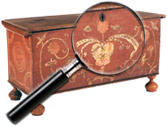|
|
Silver Argylles
Eighteenth and 19th century silversmiths produced a tea or coffeepot form gravy warmer known as an argyll, that used a variety of means to keep the gravy warm. The form, with handle and spout, is sometimes spelled as Argyle. Those argylles using hot water as the warming agent typically had double exterior walls, or a compartment created by a false bottom, or a central vertical tube to hold the hot water. Occasionally [...] Click here to continue reading.
Cartouche – Definition
The decorative arts world has many “squishy” and vague vocabulary words, but few are “squishier” and vaguer than cartouche. Originally, the term comes from Egyptology and is used to describe a oval enclosing hieroglyphics and having a horizontal line at one end. (The line denotes royalty.) The oval had significance not unlike that of a closed circle, in that it was believed that an oval around a person’s name provided protection [...] Click here to continue reading.
Mustard
The word mustard is thought to come from two words: “mustum,” a Latin word for young wine, which is called must, and “ardens,” a Latin word for hot. It was a hot condiment made by grinding mustard seeds up with must to form a paste, and still today as a condiment made from mustard seeds (whole, ground, or cracked) and mixed with a liquid like water or lemon juice to create a paste, [...] Click here to continue reading.
Sotheby’s Catalogue Note regarding the silver hand seal of the 1st Continental Rifle Regiment.
Sotheby’s, Important Americana, 24-25 January 2014.
Catalogue Note: Lost to time for over two hundred years and recently rediscovered, this silver seal is one of only two surviving objects related to the famous 1st Continental or Rifle Regiment, the first American unit to be raised, equipped and paid directly by the Continental Congress. Also known as the Continental Rifle Regiment, [...] Click here to continue reading.
Captain Hall J. Tibbits (American, 1797 to 1872)
This article about the life and career of Captain Tibbits by Eric C. Rodenberg appeared on the 4 November 2013 front page of Antique Week’s National Section. Used by permission. http://www.antiqueweek.com.
1800s Sea Captain’s Life Told Through Collection
At 6 foot, 4 inches tall and “powerfully built” Capt. Hall Jackson Tibbits would brook no foolishness.
After his “religious principles” were violated by passengers dancing on [...] Click here to continue reading.
Collection of Florence P. and William W. Griffin
Bill and Florence Griffin met at an Atlanta Bird Club meeting in 1945. Bill was a published amateur ornithologist; Florence was interested in all of nature – she knew the names of all the plants as well as the birds.
Both were from Georgia, and soon began to see their state changing before their eyes as the New South swept away the Old. They quickly became [...] Click here to continue reading.
Wallace Silver Co.
Grand Colonial Pattern 1942 to 2009.
Morse – Definition
We live in a rather disposable era just now, with plastic buttons popping off in the laundry and pants with broken zippers being discarded, but in the past, the medieval past, luxury goods like fabric and closure accessories like buttons and clasps were difficult to come by. Their expensive nature meant they needed to be easily salvageable and clothing was designed with this in mind. Take for instance a cope, which [...] Click here to continue reading.
Chrome by Chase- The Art Deco Years
The Art Deco style may have originated in Europe, but Americans embraced it for everything from skyscrapers to soap dishes, and nobody did it better than Chase.
First Waterbury, then Chase Art Deco buildings like the Chrysler Building and Radio City Music Hall in New York, the Union Terminal in Cincinnati, and much of Miami Beach needed lighting and accessories to go with this exciting new [...] Click here to continue reading.
Vermeil
“Vermeil” is a French word co-opted by the English in the 19th century for a silver gilt process. Vermeil is a combination of silver and gold, although other precious metals are also occasionally added, that is then gilded onto a sterling silver object. The reddish (vermilion) hue of the addition of the gold gives the product its name. Vermeil is commonly found in jewelry, and a standard of quality (10 karat gold) and [...] Click here to continue reading.
|
Recent Articles
- Charles Alfred Meurer – American Artist & Tromp L’Oeil Artist
- Sendak, Maurice – American Artist & Writer
- Godie, Lee – American Artist
- Davis, Vestie – American Artist
- Bartlett, Morton – American Artist
- Mackintosh, Dwight – American Artist
- Evans, Minnie Jones – African-American Artist
- Mumma, Ed (Mr. Eddy) – American Artist
- Nice, Don – American Artist
- Savitsky, John (Jack) – American Artist
- Gordon, Harold Theodore (Ted) – American Artist
- Dial, Thornton – African-American Artist
- Doyle Sam – American Artist
- Johnson, Lester Frederick – American Artist
- Finster, Howard – American Artist
|
|
